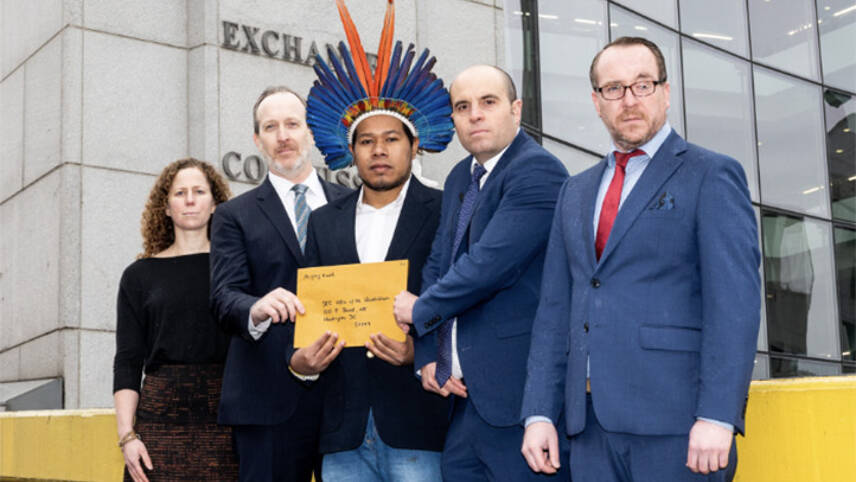Register for free and continue reading
Join our growing army of changemakers and get unlimited access to our premium content

The complaint was filed late last week. Image: Mighty Earth
JBS is the world’s largest food business and is best known for its meat processing. It has meat supply chains in nations including the US and Brazil. It has, over the years, faced ire from environmental campaigners over its impact on forests and waterways, plus its emissions footprint, including methane from cattle.
In the summer of 2021, shortly after stating an ambition to reach net-zero carbon by 2040, JBS issued a $1bn package of sustainability-linked bonds. The bonds, JBS stated at that time, were intended to leverage funding for the business to reduce its global Scope 1 (direct) and 2 (power-related) emissions intensity by at least 30% by 2030 compared to 2019 levels.
JBS subsequently issued more than $2bn of sustainability-linked or ‘green’ bonds, Mighty Earth claims.
The advocacy organisation is arguing that the bond packages should not have been badged as ‘green’ or ‘sustainability-linked’, given that they will not fund activities to bring down JBS’s Scope 3 (indirect) emissions. As is the case for most large multinational food firms, JBS’s Scope 3 emissions account for the majority of its footprint – upwards of 97%, Mighty Earth Claims.
Mighty Earth alleges that investors would likely believe that the bonds contributed to decarbonisation across JBS’s value chain, supporting a net-zero value chain by 2040 beyond areas the firm has direct control over. In any case, they do not believe investors would so readily back bonds which finance activities to address just 3% of JBS’s emissions.
“JBS seduced investors with sustainability pledges, but those pledges had practically zilch to do with the actual source of JBS’ supersized climate impact,” said Mighty Earth’s chief executive Glenn Hurowitz. “Companies simply shouldn’t be able to ignore the environmental impact of 97% of their operations and then market themselves as green.
“We need trillions of dollars in investment in decarbonisation, but it shouldn’t be wasted on industrial meat companies that are driving deforestation and spewing pollution into the atmosphere.”
JBS claims that it was clear in telling investors that “these bonds are not intended to fund the entire decarbonisation process as part of our net-zero target and were designed and structured to begin addressing Scope 1 and 2 emissions only”.
The corporate has also been keen to allay allegations that it has no plan to tackle Scope 3 emissions, promising to submit targets to the Science Based Targets Initiative (SBTi) in 2023, under the inititative’s Net-Zero Standard. The Standard requires participants to reduce absolute emissions by 90% by 2050, across all scopes. As such, JBS will need to build on its intensity-based emissions targets covering Scopes 1 and 2 only. Intensity-based targets can technically allow firms to grow their absolute emissions footprint, so long as they are improving efficiency.
It can take the SBTi up to two years to verify targets. JBS first promised SBTi-aligned targets in early 2021.
A JBS spokesperson said the SBTi goals “will allow us to build a comprehensive roadmap plan of action based on data to achieve this goal across our global operations, including scope 3 emissions”.
The spokesperson added: “Importantly, we have a number of scope 3 projects already underway around the world,” but did not name any specific projects.
What happens next?
Mighty Earth believes that its complaint is the first to be filed against a sustainability-linked bond at the US SEC. It is emphasising that investors, in choosing green bonds, should be clearly able to access information about the total environmental footprint of the involved business and should rest assured that their money is supporting climate projects in the most impactful parts of the related company’s value chain.
The SEC will now need to choose whether to proceed with the complaint and investigate JBS’s marketing of its bonds as a potential case of securities fraud. Should it choose to do so, Mighty Earth has stated, it will set a precedent to protect investors from “wrongdoing” companies which “mislead, conceal and massively under-report their climate emissions”.
The SEC filed 760 enforcement actions on entities committing securities fraud last year – a 9% increase year-on-year. Cases can take place over several years, with the SEC able to mandate “follow-on” proceedings.
Join the greenwashing conversation during edie’s Engagement Week 2023
23 – 27 January is edie’s Engagement Week, with daily articles, interviews, opinions, reports and events to be published and held – all dedicated to the theme of sustainability communications and combatting greenwash.
Brought to you by the award-winning edie content team, this is our themed week of editorial content and events dedicated to supporting sustainability, energy and CSR professionals in getting to grips with the everchanging sustainability reporting landscape and drive stakeholder engagement through captivating communications. This year’s ENGAGEMENT WEEK has a specific focus on combatting greenwash. The discussions held and articles published are timely given that research has shown that one in every five cases of corporate risk incidents linked to environmental, social and governance (ESG) issues stems from greenwashing and misleading communications.
Click here to follow all our Engagement Week content.


Please login or Register to leave a comment.